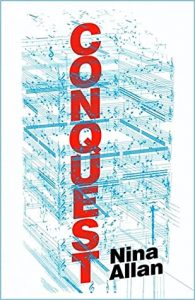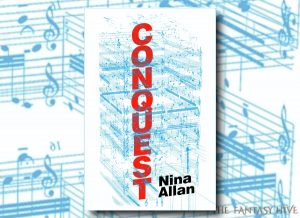CONQUEST by Nina Allan (BOOK REVIEW)
“Frank says information is corrosive, like acid – once you touch it, you’re changed by it, you find you’ve been burned. Not long after Frank went missing I spent most of a week online, hanging out on the forums. I thought I might be able to make contact with the people Frank had been talking to, or that I might stumble across some useful information. I spent so long staring into a screen the outside world began to seem less real, like a stage set, like it might crack into pieces. I remember thinking the colours were too bright, like they were fake, painted on. I started wondering if my movements were being tracked, if the simple act of looking at certain web pages had marked me out as dangerous. I knew I was being ridiculous but at the same time there was part of me that was convinced I was on the brink of a major discovery. As if everything in the world had meaning, suddenly.”
Long-time readers will know that I consider Nina Allan the finest author currently writing regardless of genre. Her latest novel Conquest (2023) is, even by the high standards of her previous work, a revelation. In many ways, the new novel is a culmination of Allan’s artistic explorations to date. It is both beautifully written and formally experimental, with Allan folding in numerous voices, including a section of an imaginary classic science fiction novel, a concert review and an article on a real film and the imaginary book. It draws on the narrative traditions and modes of both SF and detective fiction, yet cannot be easily categorised as either. And it’s an intimate exploration of the inner lives of a handful of well-realised, flawed characters and their variously dysfunctional relationships. Throughout Conquest, Allan draws unexpected connections between Bach’s music and the Strugatsky brother’s Roadside Picnic (1972, translated into English 1977), computer code and musical language, the Tarkovsky film of Lem’s Solaris (1972) and Ziggy Stardust. Is Conquest about a sinister secret alien invasion, the search for a man who goes missing, or an exploration of paranoia and misinformation? It would be more true to say that Conquest is and isn’t about all these things; it’s a novel concerned with the deceptive ways in which we perceive the world around us and how different perspectives and lived experience can lead us to radically different conclusions drawing from the same evidence. Consensus reality is a slippery thing, especially in Allan’s books. Conquest is a haunting, thought-provoking speculative masterpiece, a riveting demonstration of an artist in masterful control of her material.
 Frank Landau is a brilliant coder who has recovered from several breakdowns, a Bach enthusiast who grew up on an estate in south-east London. Frank’s natural fascination for seeing patterns everywhere leads him into the world of online conspiracy theorists, who believe that an invisible war is being waged over the fate of the Earth. His partner Rachel Gabon worries for him, especially when Frank decides to meet his friends from the conspiracy forums in Paris and completely disappears. Rachel seeks the help of a private investigator, Robin, to track him down and find out what happened. Robin shares a love of Bach with Frank, as well as a darker secret that links to her adopted parents and the reason she quit the police force. As Robin follows the breadcrumbs left in the wake of Frank’s disappearance, she finds her rationality, her impartiality and her worldview all challenged. As she develops feelings for her client and finds further connections between Frank’s disappearance and a gang shooting from before she was born, Robin begins to question what exactly is truth and reality, and if Frank and his internet friends are really so crazy after all.
Frank Landau is a brilliant coder who has recovered from several breakdowns, a Bach enthusiast who grew up on an estate in south-east London. Frank’s natural fascination for seeing patterns everywhere leads him into the world of online conspiracy theorists, who believe that an invisible war is being waged over the fate of the Earth. His partner Rachel Gabon worries for him, especially when Frank decides to meet his friends from the conspiracy forums in Paris and completely disappears. Rachel seeks the help of a private investigator, Robin, to track him down and find out what happened. Robin shares a love of Bach with Frank, as well as a darker secret that links to her adopted parents and the reason she quit the police force. As Robin follows the breadcrumbs left in the wake of Frank’s disappearance, she finds her rationality, her impartiality and her worldview all challenged. As she develops feelings for her client and finds further connections between Frank’s disappearance and a gang shooting from before she was born, Robin begins to question what exactly is truth and reality, and if Frank and his internet friends are really so crazy after all.
Conquest is remarkable for how much it works by insinuation and suggestion, setting up a series of provocative connections that encourage a paranoiac reading similar to Frank’s worldview whilst critiquing Frank’s own self-absorption and abdication of personal responsibilities. It is a novel very much about that paranoid mind state, and Allan expertly creates an atmosphere of unease where every mundane element seems fraught with portentous hidden symbolism. This is encouraged through the juxtaposition of the narrative, which is largely told from Robin’s perspective, with the intertextual materials, which include The Tower by John C. Sylvester, an imaginary science fiction novel published in the 1950s, an interview with Rachel, and two essays/reviews by Edmund de Groote and Jeanne-Marie Vanderlien, two of Frank’s friends from the internet conspiracy forum LAvventura who happen to share surnames with infamous London gangsters, that are as much manifestos on how they see the world as reflections on the works of art they talk about. On the surface of it, it’s entirely reasonable to respond to the story as if Frank is a vulnerable adult who has been targeted by hucksters on the internet, leaving poor Rachel behind to pick up the pieces, and that Robin’s sympathy for Frank’s worldview even as she disapproves of his selfishness, coupled with her infatuation with Rachel and the case’s links to the old gang fight that shaped her life before she was even born, have deeply compromised her integrity as a detective. But the reasonable, rational voice of the main narrative is being constantly undermined by the interstitial texts, which imply a sinister alien invasion on a cellular level, a contamination of the human world by something inextricably Other that is rewriting our reality into something unfamiliar and threatening. By the end of the text, where Allan offers us two possible resolutions, each as valid as the other but neither assuaging any of the paranoid doubts in the reader’s mind, we are left with only the uncertainty, not just of what we have just read but of our own subjective experiences.
John C. Sylvester’s The Tower tells a story of a business magnate who, following an interstellar war, imports blocks of alien granite to build an enormous tower, only for the mould in the granite to spread an alien infection throughout the tower block’s human inhabitants. The story reads like the classic post-war British disaster novels, like John Wyndham’s The Day of the Triffids (1951), to which Rachel and Frank compare it. Allan expertly plays the voice of these vintage works of science fiction – paternal, authoritative, somewhat stilted but capable of great power – with the very different narrative voice of a modern speculative novel, to show both the similarities and the differences in how they approach a similar theme, that of an unseen insidious alien invasion. Similarly, the narrative voice of the main novel is also contrasted with Edmund de Groote’s smugly self-assured readings of The Tower and Shane Carruth’s film Upstream Color (2013), which are persuasively argued but reveal much of Edmund’s own myopia, and Jeanne-Marie Vanderlien’s review of a concert of music by Hans Werner Henze and Ingeborg Bachmann, which reveals far more about Jeanne-Marie’s prickly relationships with her friends than the music itself. All of these imaginary documents present compelling visions of alien invasion, a fantastical explanation for the increasingly alienated world that we live in, whilst at the same time critiquing the characters who are writing these documents, forcing the reader to acknowledge the inherent flaws and biases in how they see the world. This conflict between the texts drives much of Conquest’s alluring ambiguity. With its clever use of a novel within a novel, it recalls M. T. Hills’ Zero Bomb (2019), and in its ambiguous exploration of a sinister cellular invasion that is never seen but always felt it is in dialogue with Hills’ The Breach (2020).
All of this only hints at the marvels contained within Conquest. The novel contains some wonderful reflections on the music of Bach and David Bowie. Writing about music is infamously difficult to do, but Allan does it with aplomb, inviting the reader to hear fresh nuances in familiar material whilst elucidating the appeal and attraction for those who don’t have that knowledge and familiarity with the workings of Bach’s music. The novel also contains some of Allan’s most compelling characters, and there are some typically lovely sequences in which, as we get to know the characters’ histories, they are confronted with hidden truths about themselves. It’s also, as Allan mentions in the acknowledgements, a reflection of the strange and challenging times in which it was written. In a world where consensus reality is being contested daily and conspiracy theories spread faster than news, Allan’s explorations of the nature of truth and the problems with subjectivity and its inherent biases feel more relevant than ever. Conquest is compelling, confounding and challenging, a powerful work of speculative fiction that demonstrates Allan’s remarkable command of her ambitious material.
Conquest is out from Quercus books on 11th May. Order your copy HERE

